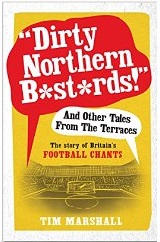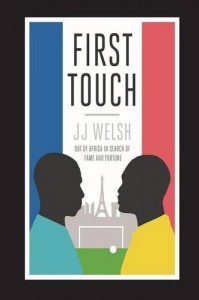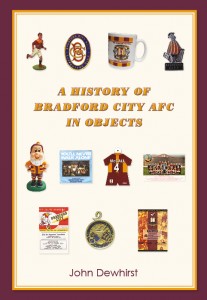 “Just Visiting”, is the story of Crystal Palace’s 2013/14 season in the Premier League, one in which the football pundits, (and maybe even some of the Palace faithful), predicted would see the club from Selhurst Park confirm their ”yo-yo team” status and return to the Championship.
“Just Visiting”, is the story of Crystal Palace’s 2013/14 season in the Premier League, one in which the football pundits, (and maybe even some of the Palace faithful), predicted would see the club from Selhurst Park confirm their ”yo-yo team” status and return to the Championship.
Indeed the belief that ‘The Eagles’ sojourn in the English top flight could have been a brief one, is alluded to in the title of this book by S. B. Mann.
The cover is eye-catching, featuring the black away kit used during the season which came to be known as the “evil sash”.
Of the book itself, it consists of 343 pages and follows a diary format from the preseason outing at Dagenham & Redbridge, taking in the League Cup and FA Cup fixtures along the way, through to the final Premier League game at Craven Cottage against Fulham.
In terms of the content, there is a formulaic approach with S. B. Mann providing his thoughts and anecdotes on match-days, with a detailed report by Mark Gardiner, which includes Gardiner’s marks for the Palace player’s on the day. The book also contains a season summary, which includes a review from Mann and Gardiner, details of their ‘Player of the Year Awards’ and a more comprehensive match-by-match analysis of the marks awarded by Gardiner. This approach and detail ensures that the book is a thorough review of the season from two obviously very dedicated and devoted Palace fans.
Interestingly and honestly, Mann explains that the idea for the book didn’t come prior to the start of the season, but was triggered instead by the visit to Anfield a couple of months into the campaign. This meant that the author had to retrospectively recount his thoughts from the preseason and the games up to the Liverpool fixture.
The reason for mentioning this is that rather like Palace’s opening fixtures in the 2013/14 season, the book is slow to start and this is maybe down to the fact that Mann has to recall his thoughts from the early games. Indeed, in a parallel to ‘The Eagles’ fortunes, the longer the book goes on, the more the author seemed to warm to the task and the immediacy of the diary approach works, as the reader is introduced to Mann’s match-day routine at home and away.
Mann covers many of the gripes that affect modern day fans – price of tickets, changing of date and time of fixtures, clubs fielding weakened team in the League and FA Cup, the influence of SKY – as well as talking about events such as Heysel and Hillsborough. His use of ‘endnotes’ is useful in providing links to articles and websites that reinforce his points.
However, there are other topics which get quite an airing, these being away ticket allocation, the issue of fans standing or sitting, the treatment of disabled fans and finding somewhere at grounds to smoke. Mann’s concerns around the method of away tickets allocation and the standing/sitting debate, is an issue close to home as it relates to his mother and the need for her to be able to sit down with an unobstructed view. The author approaches the subjects with an honesty and integrity that is apparent throughout the book.
Whilst Mann provides overall observations on the fixtures he attends, Mark Gardiner provides detailed match reports, which as Steve Browett (Co-owner of Crystal Palace) observes in the Foreword, “are far more valuable and insightful than any that you will have read on the back pages of the Sunday papers.”
Gardiner writes with no little humour; some of it very much tongue-in-cheek, an example being that from a preseason friendly at Selhurst Park, in which he observes, “Lazio spurned some good chances and probably eased off in anticipation of sampling a night out in Croydon.”
The combination of material from Mann and Gardiner works well and as stated earlier, this is a book with honesty and integrity. Overall, it is a good review of a memorable season for the Palace faithful, through the eyes of two loyal fans. There is so much that is positive and can be recommended about “Just Visiting”, however it has its faults.
Mann openly apologises for the “inevitable proof reading errors”. However, despite his candidness in this, the reality is that the book would have benefited from a more thorough proof reading and editing exercise. The book unfortunately does contain grammatical errors, missing words, poor paragraph spacing, and inconsistent use of fonts, with even mistakes on the front cover.
Perhaps surprisingly, there is also a football error in relation to Mann’s visit to what is detailed as the “Hearts v Dundee” fixture. Firstly, the game in Edinburgh featured Dundee United rather than their neighbours Dundee and secondly, Mann states he “headed off in search of Tannerdice”. This is unfortunately wrong on two counts – firstly the spelling should read, Tannadice, and secondly, the game was at Hearts, so the ground he attended was Tynecastle.
Mann states that, “writing a book is often a compromise between the desire and the practical” and so this book is an attempt, “to accomplish something worthwhile within a reasonable budget.”
“Just Visiting” is a book that achieves that aim.
 “This is a book about the wisdom of the masses, and the madness of the crowd. It’s about football and Britain, and Britain and football, because you cannot understand one without the other.”
“This is a book about the wisdom of the masses, and the madness of the crowd. It’s about football and Britain, and Britain and football, because you cannot understand one without the other.” The William Hill Sports Book of the Year is an award that is never afraid to tackle serious subjects, as witnessed by the recent winners. In 2011 A Life Too Short: The Tragedy of Robert Enke explored the depression and subsequent suicide of the one-time German international goalkeeper, while in 2012 (The Secret Race: Inside the Hidden World of the Tour de France) and 2013 (Doped: The Real Life Story of the 1960s Racehorse Doping Gang), the murkier side of cycling and horseracing were exposed.
The William Hill Sports Book of the Year is an award that is never afraid to tackle serious subjects, as witnessed by the recent winners. In 2011 A Life Too Short: The Tragedy of Robert Enke explored the depression and subsequent suicide of the one-time German international goalkeeper, while in 2012 (The Secret Race: Inside the Hidden World of the Tour de France) and 2013 (Doped: The Real Life Story of the 1960s Racehorse Doping Gang), the murkier side of cycling and horseracing were exposed. What makes a good crime thriller? In short a book which has good pace, characters that all make creditable suspects and a plot with twists and turns that keep you guessing right till the end; a book that you can’t put down as you want to know what happens next. And on that score, Matt Carrell’s A Matter of Life and Death, fits the bill.
What makes a good crime thriller? In short a book which has good pace, characters that all make creditable suspects and a plot with twists and turns that keep you guessing right till the end; a book that you can’t put down as you want to know what happens next. And on that score, Matt Carrell’s A Matter of Life and Death, fits the bill. Not just a lack of thrill in Brazil…
Not just a lack of thrill in Brazil… Odyssey: a long and eventful or adventurous journey or experience.
Odyssey: a long and eventful or adventurous journey or experience. The fourth instalment of the Alfie Jones series opens with the central character scanning the table of the Middleton District Youth League Division 2. With three games to go in the season, Alfie’s team, the Kingsway Colts are bottom of the league.
The fourth instalment of the Alfie Jones series opens with the central character scanning the table of the Middleton District Youth League Division 2. With three games to go in the season, Alfie’s team, the Kingsway Colts are bottom of the league. There was a time when the Africa Cup of Nations (AFCON) was a tournament that was generally ignored by the media, clubs and fans in Europe. However, this tide has turned over the years as African players such as Roger Milla, Abedi Pele, Kanu, Samuel Eto’o, Didier Drogba and Yaya Toure have become famous names not only in Europe, but around the world.
There was a time when the Africa Cup of Nations (AFCON) was a tournament that was generally ignored by the media, clubs and fans in Europe. However, this tide has turned over the years as African players such as Roger Milla, Abedi Pele, Kanu, Samuel Eto’o, Didier Drogba and Yaya Toure have become famous names not only in Europe, but around the world. “Just Visiting”, is the story of Crystal Palace’s 2013/14 season in the Premier League, one in which the football pundits, (and maybe even some of the Palace faithful), predicted would see the club from Selhurst Park confirm their ”yo-yo team” status and return to the Championship.
“Just Visiting”, is the story of Crystal Palace’s 2013/14 season in the Premier League, one in which the football pundits, (and maybe even some of the Palace faithful), predicted would see the club from Selhurst Park confirm their ”yo-yo team” status and return to the Championship. Why has it taken so long for this book to reach the English speaking world? Unhaltbar — Meine Abenteuer als Welttorhüter was published in Germany during 2009 and it has now been updated and translated into English. The book has won accolades from far and wide and also made it onto the William Hill Sports Book of the Year 2014 ‘long-list’.
Why has it taken so long for this book to reach the English speaking world? Unhaltbar — Meine Abenteuer als Welttorhüter was published in Germany during 2009 and it has now been updated and translated into English. The book has won accolades from far and wide and also made it onto the William Hill Sports Book of the Year 2014 ‘long-list’. Imagine visiting an exhibition that told the story of your football club through a myriad of ephemera, memorabilia and club relics; room upon room of programmes, badges and medals, oozing with the history and tradition of the team you support.
Imagine visiting an exhibition that told the story of your football club through a myriad of ephemera, memorabilia and club relics; room upon room of programmes, badges and medals, oozing with the history and tradition of the team you support.